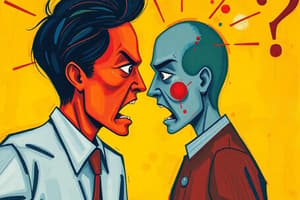Podcast
Questions and Answers
What is a physical consequence of unmanaged anger issues?
What is a physical consequence of unmanaged anger issues?
- Reduced anxiety
- Improved cardiovascular health
- Enhanced self-esteem
- Hypertension and digestive problems (correct)
Which of the following is a strategy for managing anger issues in frustration?
Which of the following is a strategy for managing anger issues in frustration?
- Denying or justifying anger
- Seeking revenge or retaliation
- Identifying and addressing underlying issues (correct)
- Suppressing emotions and avoiding conflicts
What is a characteristic of anger issues in frustration?
What is a characteristic of anger issues in frustration?
- Increased self-esteem
- Intensity and persistence of anger (correct)
- Lack of emotional expression
- Occasional and controlled feelings of anger
What is a common cause of anger issues in frustration?
What is a common cause of anger issues in frustration?
What is an emotional consequence of unmanaged anger issues?
What is an emotional consequence of unmanaged anger issues?
What is a key feature of impulsivity in anger issues?
What is a key feature of impulsivity in anger issues?
What is a common manifestation of anger issues in frustration?
What is a common manifestation of anger issues in frustration?
What is a benefit of seeking support for managing anger issues?
What is a benefit of seeking support for managing anger issues?
What is the primary difference between goal-frustration and means-frustration?
What is the primary difference between goal-frustration and means-frustration?
Which of the following is an example of an internal factor that contributes to frustration?
Which of the following is an example of an internal factor that contributes to frustration?
What is a common effect of frustration on an individual's cognitive abilities?
What is a common effect of frustration on an individual's cognitive abilities?
What is the primary goal of reappraisal as a coping strategy for frustration?
What is the primary goal of reappraisal as a coping strategy for frustration?
What is a common behavioral consequence of unmanaged frustration?
What is a common behavioral consequence of unmanaged frustration?
What is a key difference between problem-focused coping and emotion-focused coping strategies for managing frustration?
What is a key difference between problem-focused coping and emotion-focused coping strategies for managing frustration?
Flashcards are hidden until you start studying
Study Notes
Anger Issues in Frustration
Definition of Anger Issues
- Anger issues refer to intense, uncontrolled, or excessive feelings of anger that interfere with daily life and relationships
- Can manifest as verbal or physical aggression, irritability, or mood swings
Causes of Anger Issues in Frustration
- Feeling trapped or stuck in a situation
- Sense of injustice or unfairness
- Lack of control or powerlessness
- Unmet needs or expectations
- Past trauma or emotional baggage
Characteristics of Anger Issues in Frustration
- Intensity: Anger feels overwhelming and uncontrollable
- Duration: Anger persists for extended periods, even after the trigger has passed
- Frequency: Anger episodes occur frequently, often in response to minor annoyances
- Impulsivity: Acting on anger without thinking through consequences
- Aggression: Verbal or physical outbursts towards oneself or others
Physical and Emotional Consequences of Anger Issues
- Physical: Headaches, hypertension, digestive problems, and cardiovascular disease
- Emotional: Anxiety, depression, low self-esteem, and strained relationships
Strategies for Managing Anger Issues in Frustration
- Identification and awareness: Recognizing triggers and patterns of anger
- Relaxation techniques: Deep breathing, progressive muscle relaxation, and visualization
- Communication skills: Expressing feelings and needs assertively, without aggression
- Problem-solving: Addressing underlying issues and finding solutions
- Seeking support: Counseling, therapy, or support groups for anger management
Anger Issues in Frustration
Definition and Manifestation
- Anger issues involve intense, uncontrolled, or excessive feelings of anger that interfere with daily life and relationships
- Manifests as verbal or physical aggression, irritability, or mood swings
Causes and Triggers
- Feeling trapped or stuck in a situation, leading to feelings of powerlessness
- Sense of injustice or unfairness, resulting in resentment
- Unmet needs or expectations, causing frustration
- Past trauma or emotional baggage, contributing to anger issues
Characteristics of Anger Issues
- Anger feels overwhelming and uncontrollable, with intense emotional arousal
- Anger persists for extended periods, even after the trigger has passed
- Anger episodes occur frequently, often in response to minor annoyances
- Impulsive behavior, acting on anger without thinking through consequences
- Verbal or physical aggression towards oneself or others
Physical and Emotional Consequences
- Physical consequences: Headaches, hypertension, digestive problems, and cardiovascular disease
- Emotional consequences: Anxiety, depression, low self-esteem, and strained relationships
Management Strategies
- Identify and become aware of triggers and patterns of anger
- Use relaxation techniques such as deep breathing, progressive muscle relaxation, and visualization
- Develop effective communication skills to express feelings and needs assertively
- Address underlying issues and find solutions through problem-solving
- Seek support from counseling, therapy, or support groups for anger management
Definition of Frustration
- Frustration is a feeling of dissatisfaction, accompanied by anxiety, anger, or disappointment, resulting from the inability to fulfill a desire, need, or goal.
Types of Frustration
- Goal-frustration: inability to achieve a specific goal or objective.
- Means-frustration: lack of resources, skills, or knowledge to achieve a goal.
- Role-frustration: conflict between expected and actual roles or responsibilities.
- Task-frustration: difficulty with a specific task or activity.
Causes of Frustration
Internal Factors
- Unrealistic expectations or goals.
- Lack of self-efficacy or confidence.
- Perfectionism.
External Factors
- Environmental obstacles or barriers.
- Social or cultural pressures.
- Lack of resources or support.
Effects of Frustration
Emotional Effects
- Anxiety, anger, or aggression.
- Decreased motivation and self-esteem.
- Burnout or exhaustion.
Cognitive Effects
- Decreased problem-solving ability and creativity.
- Impaired decision-making and judgment.
Behavioral Effects
- Aggressive behavior or outbursts.
- Withdrawal or avoidance.
- Procrastination or escapism.
Coping with Frustration
- Reappraisal: reframe the situation or goal to reduce frustration.
- Problem-focused coping: identify and address the source of frustration.
- Emotion-focused coping: manage emotions and reduce stress.
- Support-seeking: seek help or guidance from others.
Studying That Suits You
Use AI to generate personalized quizzes and flashcards to suit your learning preferences.




